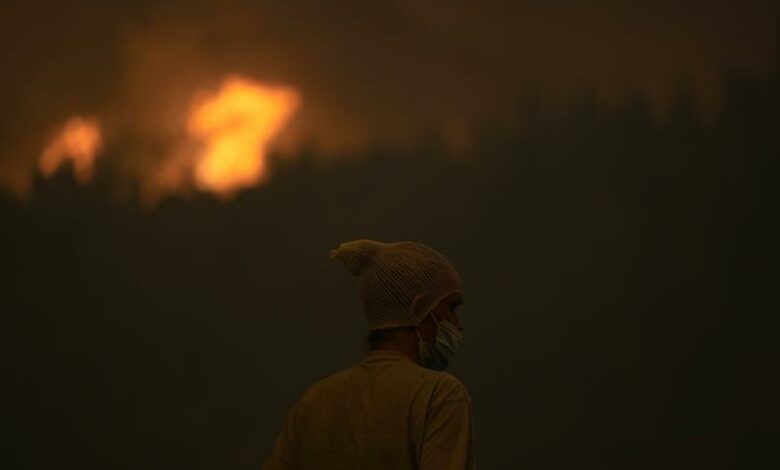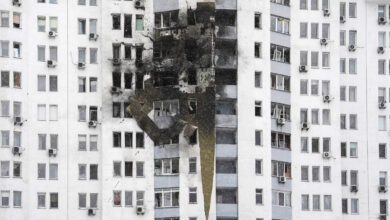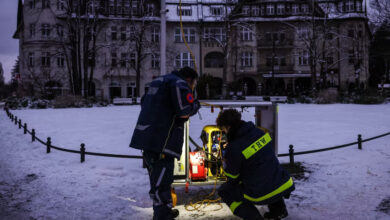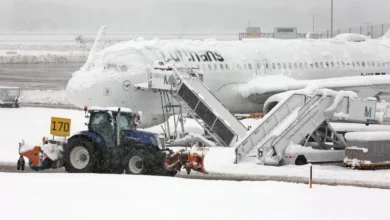
GOUVES, Greece (AP) — Pillars of billowing smoke and ash blocked out the sun above Greece’s second-largest island and turned the sky orange as a days-old wildfire devoured pristine forests and triggered more evacuation alerts Sunday, while residents appealed for additional firefighting help.
The fire on Evia, an island of forested mountains and canyons laced with small coves of crystalline water, began Aug. 3 and cut across the popular summer destination from coast to coast, burning out of control for five days. Scores of homes and businesses have been destroyed, and thousands of residents and vacationers have been evacuated.
The blaze currently is the most severe of dozens that broke out in Greece in the wake of the country’s most protracted and intense heat wave in three decades, which sent temperatures soaring to 45 degrees Celsius (113 F) and created bone-dry conditions.
The Greek coast guard said three patrol boats, four navy vessels, one ferry, two tourist boats and numerous fishing and private boats were on standby to carry out more potential evacuations from the seaside village of Pefki, on Evia’s northern tip.
Around 350 people already boarded the ferry, the coast guard said, while towering flames cut off many escape routes by roads. Evacuation orders were issued for four villages, including Pefki, but some residents refused to leave, hoping to save their properties.
Planes and helicopters dropped water on the flames from above.
“It’s already too late, the area has been destroyed,” lamented Giannis Kontzias, mayor of the north Evia municipality of Istiaia, on Greece’s Open TV. Residents of nearby villages had been urged to head to Istiatia, a town of 7,000 in northern Evia that firefighters battled to save overnight.
Villagers and people in north Evia’s main harbor, Aidipsos, were urged to shut windows, doors and chimneys to prevent burning embers from entering houses.
Civil Protection chief NIkos Hardalias said the conditions on Evia were particularly tough for the water-dropping planes and helicopters. Their pilots faced “great danger” with limited visibility, air turbulence and wind currents from the fire., he said.
“We have before us one more difficult afternoon, one more difficult night,” Hardalias said. “All the forces that have been fighting a difficult battle all these days will continue operating with unabated intensity, with the same self-sacrifice.”
Overnight, the coast guard and ferries evacuated 83 people from beaches in northern Evia. On Friday night, ferries evacuated more than 1,000 people from beaches and a seaside village in apocalyptic scenes as flames raged on the hillsides behind them.
Local officials and residents in north Evia called in to television news programs on Saturday, appealing for more firefighters and water-dropping planes.
The fire department said 575 firefighters with 35 ground teams and 89 vehicles were battling the Evia wildfire, including 112 Romanian and 100 Ukrainian firefighters sent to Greece as reinforcements. Four helicopters and three planes, including a massive Beriev-200 plane leased from Russia, provided air support.
Three more major fires were also burning Sunday in Greece’s southern Peloponnese region, while a massive fire that ravaged forests, homes and businesses on the northern fringes of the Greek capital appeared to be on the wane. That fire burnt through large tracts of a national park on Mount Parnitha, the largest forested area remaining near Athens that still bore deep scars from a fire in 2007.
Rekindling of the fire north of Athens was a constant concern, Hardalias said, adding that firefighters and the military had been patrolling all night to tackle the situation. One firefighter was transferred to hospital Sunday after loosing consciousness during a patrol, Hardalias said. His condition was not life-threatening.
On Friday, one volunteer firefighter died after suffering head injuries from a falling electricity pole north of Athens, while at least 20 people have been treated for fire-related injuries, including two firefighters who were hospitalized in intensive care.
The causes of the fires are under investigation. Three people were arrested Friday — in the greater Athens area, central and southern Greece — on suspicion of starting blazes, in two cases intentionally.
Another person, a 47-year-old Greek, was arrested Saturday afternoon in the Athens suburb of Petroupoli for lighting two fires in a grove and setting four dumpsters on fire, police said.
Ten countries have already sent personnel and firefighters equipment such as aircraft to Greece, while another eight are sending further reinforcements.
Greek Prime Minister Kyriakos Mitsotakis visited the fire department’s headquarters in Athens Saturday and expressed his “deep sadness” for the volunteer firefighter’s death. He later visited the airport from which firefighting planes take off and thanked the pilots, both Greek and French.
Securing aid for everyone affected by the wildfires will be “my first political priority,” the prime minister said, promising that all burnt areas would be reforested.
“When this nightmarish summer has passed, we will turn all our attention to repairing the damage as fast as possible, and in restoring our natural environment again,” Mitsotakis said.
Greek and European officials have blamed climate change for the large number of fires that burned through southern Europe in recent days, from Italy to the Balkans, Greece and Turkey.
Massive fires also have been burning across Siberia in northern Russia for weeks, forcing the evacuation Saturday of a dozen villages. In all, wildfires have burned nearly 15 million acres this year in Russia.
In the U.S., hot, dry, gusty weather has also fueled devastating wildfires in California.
____
Becatoros reported from Argostoli, Greece.
___
Follow AP’s climate coverage at https://apnews.com/hub/climate-change




